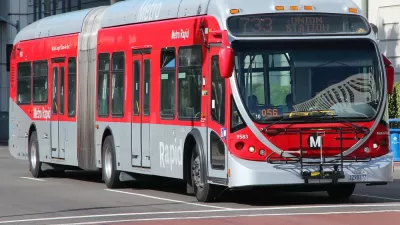This year, oil prices in America rose to heights drivers had never seen. So they cut back on driving. But that reduction is now causing oil prices to fall back down, and many say drivers will soon revert to old habits.
"The good news is that gasoline consumption has fallen compared with a year earlier in every month from March through September of this year, according to data from the Energy Information Administration. Vehicle miles traveled -- the wonky term for how much we drive -- have dropped for 11 straight months, and fell 4.4% in September, according to the Department of Transportation."
"By jamming the brakes on driving, rediscovering mass transit and walking past Hummers to buy compact cars like the Honda Fit, American consumers caused big trouble for powerful interests. The question now is how will those interests respond?"
"The oil industry and oil-producing nations have an acute problem, because the combination of conservation and the worst world-wide economic slump in decades has once again made a mockery of recent projections that oil would remain expensive and scarce forever. As of late last week, oil prices had fallen below $50 a barrel -- compared with more than $140 a barrel this summer."
"The short term, however, looks like a re-run of the late 1970s and early 1980s, when oil doomsayers were trumped by supply and demand. When oil prices soared in that era, interest in electric cars, windmills, solar heating panels and other petroleum alternatives accelerated. When conservation and new oil discoveries caused oil prices to collapse, the economic justification for expensive, immature oil replacement technology collapsed as well, and it was a skip and a jump to the age of the SUV."
FULL STORY: Americans Drive Less, Creating a Problem

Manufactured Crisis: Losing the Nation’s Largest Source of Unsubsidized Affordable Housing
Manufactured housing communities have long been an affordable housing option for millions of people living in the U.S., but that affordability is disappearing rapidly. How did we get here?

Americans May Be Stuck — But Why?
Americans are moving a lot less than they once did, and that is a problem. While Yoni Applebaum, in his highly-publicized article Stuck, gets the reasons badly wrong, it's still important to ask: why are we moving so much less than before?

Using Old Oil and Gas Wells for Green Energy Storage
Penn State researchers have found that repurposing abandoned oil and gas wells for geothermal-assisted compressed-air energy storage can boost efficiency, reduce environmental risks, and support clean energy and job transitions.

Updating LA’s Tree Rules Could Bring More Shade to Underserved Neighborhoods
A new USC study finds that relaxing Los Angeles’ outdated tree planting guidelines could significantly expand urban tree canopy and reduce shade disparities in lower-income neighborhoods, though infrastructure investments are also needed.

California's Canal Solar Projects Aim to Conserve Resources and Expand Clean Energy
California’s Project Nexus has begun generating electricity from solar panels installed over irrigation canals, with researchers and state agencies exploring statewide expansion to conserve water and boost clean energy production.

HHS Staff Cuts Gut Energy Assistance Program
The full staff of a federal program that distributes heating and cooling assistance for low-income families was laid off, jeopardizing the program’s operations.
Urban Design for Planners 1: Software Tools
This six-course series explores essential urban design concepts using open source software and equips planners with the tools they need to participate fully in the urban design process.
Planning for Universal Design
Learn the tools for implementing Universal Design in planning regulations.
Heyer Gruel & Associates PA
City of Moreno Valley
Institute for Housing and Urban Development Studies (IHS)
City of Grandview
Harvard GSD Executive Education
Salt Lake City
NYU Wagner Graduate School of Public Service
City of Cambridge, Maryland




























